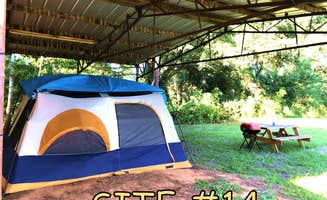Tent camping options surrounding Rolling Fork, Mississippi extend beyond the immediate town area into the broader Delta National Forest region. The wetland ecosystem creates a unique camping environment with seasonal considerations affecting campsite accessibility. Several established tent camping areas operate in this rural Mississippi area, providing varying levels of amenities and access to the natural features of the region.
What to do
Wildlife viewing opportunities: Blue Lake recreation area offers prime alligator spotting opportunities, with visitors frequently observing these reptiles sunning themselves along shorelines. According to one camper at Blue Lake, they "Saw an alligator lounging around in the lake" during their stay, adding a distinctive wildlife experience to the camping trip.
Boating and fishing: The small lake at Blue Lake provides boat-in access options for campers seeking fishing opportunities or water exploration. The recreation area features a gravel boat ramp for launching small watercraft. Black River Campsite accommodates anglers with convenient access points and supports both tent camping and RV setups for visitors primarily interested in fishing activities.
Nature trails: Several camping areas connect to walking paths when conditions permit, though seasonal flooding impacts accessibility. A visitor noted the "nature trail was flooded when we visited" at Blue Lake, indicating that trail conditions vary throughout the year and visitors should verify accessibility before planning hiking activities.
What campers like
Peaceful environment: The remote location of camping areas near Rolling Fork creates naturally quiet surroundings with minimal traffic noise. One camper at Black River Campsite appreciated "waking up to nothing but the sounds of birds and occasional splashes from the water," providing a genuine outdoor experience away from urban settings.
Basic amenities: Most established camping areas provide fundamental necessities despite their rural location. At Blue Lake, campers will find "a typical national forest vault toilet (not chem toilet)" and "trash receptacles next to the vault toilet," offering basic sanitation facilities within an otherwise primitive setting.
Small, uncrowded campgrounds: The limited number of sites at each location ensures a more private camping experience. One camper described Blue Lake as a "Small picnic area & campground along a small, pretty lake. Three campsites - 79A, 79B & 79C," highlighting the intimate nature of the best tent camping near Rolling Fork, Mississippi.
What you should know
Reservation requirements: Some campgrounds require advance booking through Recreation.gov, with additional reservation fees beyond the base camping rate. A camper at Blue Lake noted "There is no pay station, and the forest office in Rolling Fork is closed; so, you have to make a reservation online at recreation.gov to pay. Online reservation fee is $8."
Weather impacts: The low-lying terrain around Rolling Fork experiences regular flooding that affects campground accessibility. According to one visitor at North Rec Composite, "spring rains can make access roads impassable for standard vehicles" and campers should check with forest service offices about current conditions before travel.
Limited connectivity: Cell service throughout the camping areas near Rolling Fork ranges from unreliable to nonexistent. As one camper experienced, there is "No AT&T nor T-Mobile cell service" at Blue Lake, requiring visitors to plan communication needs accordingly and inform others of their whereabouts before arrival.
Tips for camping with families
Insect preparation: The wetland environment creates habitat for various insects, particularly during warmer months. A camper suggested using specialized equipment: "Insects were not too bad; we used a Thermocell insect repellent device which seemed to work" when staying at Blue Lake, showing that proper preparation can significantly improve comfort levels.
Water planning: Lack of potable water at most sites requires advance planning for family camping trips. A visitor to South Recreation Composite advised "bringing at least one gallon per person per day plus extra for cooking and cleaning" since no reliable water sources exist at the campgrounds.
Vehicle considerations: Access roads to camping areas may present challenges depending on recent weather and vehicle clearance. One camper observed that near Blue Lake, "This is a low elevation, swampy wetland which does get flooded. Two wheel drive passenger cars should make it okay when the road is mostly dry," suggesting families should consider vehicle capabilities when planning trips.
Tips from RVers
Site selection: RV campers have limited options near Rolling Fork, with Black River Campsite offering the most accommodations for larger vehicles. The campground features both "electric-hookups" and "water-hookups" according to listing information, making it suitable for self-contained camping units requiring utilities.
Generator restrictions: Many camping areas in national forest lands have noise restrictions or prohibit generators entirely. Check specific campground rules before arrival, as generator use may be limited to certain hours or prohibited completely during quiet time periods to maintain the natural soundscape.
Seasonal access: RV camping in the Delta region requires attention to seasonal road conditions. During drier periods from late fall through early spring, access improves considerably for larger vehicles seeking tent camping sites near Rolling Fork, Mississippi, with reduced risk of getting stuck on soft or flooded access roads.


